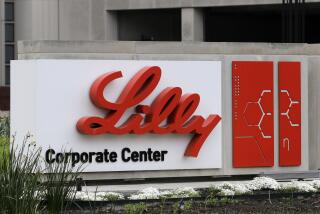Amgen Drug Is Said to Work
- Share via
Just days after Amgen Inc. said it would stop supplying patients an experimental drug for Parkinson’s disease, a research team from the University of Kentucky reported in a medical journal that the medicine worked in a clinical trial.
Don M. Gash, an author of the study, said he hoped Amgen would reconsider its decision and provide the trial drug to 48 patients who participated in company-supported studies. Many of the patients have been lobbying Amgen for the drug, which they see as their only hope.
For the record:
12:00 a.m. Feb. 19, 2005 For The Record
Los Angeles Times Saturday February 19, 2005 Home Edition Main News Part A Page 2 National Desk 1 inches; 36 words Type of Material: Correction
Amgen drug -- An article in Thursday’s Business section about the experimental Amgen Inc. drug GDNF said research about the drug was published in the Journal of Neurology. The study appeared in the Journal of Neurosurgery.
“Controversy can be good if it can get people not to take a rigid position and not to create barriers,” Gash said.
Amgen spokeswoman Marie Kennedy said she was not aware of the study.
Last week, Amgen said it would no longer provide the drug to patients because its studies showed that it did not work and might cause permanent harm. Kennedy said Wednesday that the company hadn’t abandoned its research, and would continue to support laboratory studies of the drug by academics.
The study, published in the Journal of Neurology, reported that 10 patients who had received the drug, known as GDNF, had an average 30% improvement in such areas as balance, gait and speed of hand movements. The study followed the patients for six months.
However, seven of the 10 continued to receive GDNF for a full year before Amgen stopped providing the medication. Those patients further improved and saw a 45% increase in their motor function, Gash said. “It is the difference between being wheelchair-bound and being able to walk for several miles,” he said.
Researchers saw no signs of brain damage that Amgen observed when the company tested high doses of GDNF in monkeys, Gash said. The monkeys were given six times more drug than patients in the University of Kentucky study.
“The difference between poison and medicine is the dose,” Gash said. “The patients did very well and the side effect profile is excellent.”
The report said researchers could not rule out the so-called placebo effect in which the process of being treated, rather than the drug itself, causes patients to improve.
An earlier Amgen-sponsored trial of 34 patients ended in disappointment. The company divided the patients into two groups -- half received GDNF and the rest were in a control group given saline solution. At the end of six months, Amgen concluded that GDNF was no better than a placebo.
But Gash said there were differences between the two studies that might explain the results.
All patients received GDNF directly into their brains through tubes connected to pumps implanted in their abdomens. In the University of Kentucky study, the drug entered the brain in bursts through a catheter with 40 holes that Gash likened to a “soaker hose.” Amgen used a catheter more like a garden hose that delivered the drug in a continuous drip.
Gash said he has discussed his findings with Amgen scientists. “We certainly wish Amgen would reconsider,” he said.





